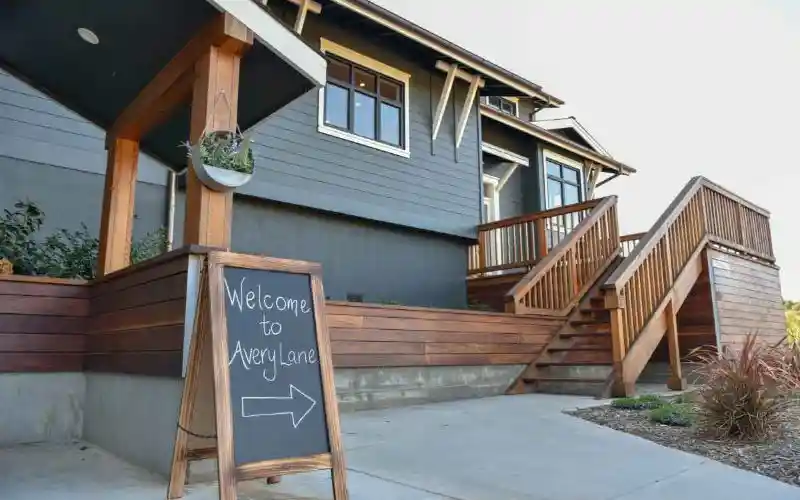Novato, California, United States
Avery Lane
Claimed
Claimed
Recovery.com has connected directly with this treatment provider to validate the information in their profile.
Joint Commission Accredited
The Joint Commission accreditation is a voluntary, objective process that evaluates and accredits healthcare organizations (like treatment centers) based on performance standards designed to improve quality and safety for patients. To be accredited means the treatment center has been found to meet the Commission's standards for quality and safety in patient care.
Provider's Policy
Avery Lane has admissions specialists ready to help you determine insurance coverage and financing options. We accept most private, commercial insurance. Please note that we are unable to accept Medi-Cal, Medicare, or Medicaid at this time. Fill out our Confidential Insurance Verification Form and we will contact you promptly.
Estimated Cash Pay Rate
The cost listed here ($35,000+) is an estimate of the cash pay price. Center pricing can vary based on program and length of stay. Contact the center for more information. Recovery.com strives for price transparency so you can make an informed decision.
About Avery Lane
Avery Lane is a women’s residential treatment facility for mental health and substance abuse recovery located north of San Francisco in Novato, California. Avery Lane is the only treatment center for women offering a fully comprehensive program to address recovery on every level. Using their unique Whole Being Recovery model, Avery Lane utilizes the latest holistic and evidence-based modalities.
Clients commit to a 30, 60, or 90 day program with therapies that can include medical detox, CBT, DBT, intensive group and individual Psychotherapy, along with holistic therapies like equine therapy, conscious recovery, expressive arts, yoga, and mindfulness. Avery Lane also specializes in Energy Psychology, which is a collection of mind-body approaches that focus on the relationship between thoughts, emotions, sensations, and behaviors. Specific Modalities within Energy Psychology are Neuro Emotional Technique, Emotional Freedom Technique,Tapas Acupressure Technique (TAT) along with others that treat co-occurring disorders.
The Avery Lane program was created by women for women and creates a safe, calming, homelike place for clients to recover without outside social pressure. The Avery Lane program is private pay.
Read More
Insurance Accepted
Provider's Policy:Avery Lane has admissions specialists ready to help you determine insurance coverage and financing options. We accept most private, commercial insurance. Please note that we are unable to accept Medi-Cal, Medicare, or Medicaid at this time. Fill out our Confidential Insurance Verification Form and we will contact you promptly.

Center Overview
Estimated Cash Pay Rate

Treatment Focus
This center treats primary substance use disorders and co-occurring mental health conditions. Your treatment plan addresses each condition at once with personalized, compassionate care for comprehensive healing.

Care Options








Treatment
Specializations
Trauma
Some traumatic events are so disturbing that they cause long-term mental health problems. Those ongoing issues can also be referred to as "trauma."
Approaches
Holistic
A non-medicinal, wellness-focused approach that aims to align the mind, body, and spirit for deep and lasting healing.
Therapies
Meditation & Mindfulness
A practiced state of mind that brings patients to the present. It allows them to become fully aware of themselves, their feelings, and the present moment.
Equine Therapy
Guided interactions with trained horses, their handler, and a therapist can help patients improve their self-esteem, trust, empathy, and social skills.
Expressive Arts
Creative processes like art, writing, or dance use inner creative desires to help boost confidence, emotional growth, and initiate change.
Family Therapy
Family therapy addresses group dynamics within a family system, with a focus on improving communication and interrupting unhealthy relationship patterns.
Yoga
Yoga is both a physical and spiritual practice. It includes a flow of movement, breathing techniques, and meditation.
Conditions We Treat
Codependency
Codependency is a pattern of emotional dependence and controlling behavior. It's most common among people with addicted loved ones.
Post Traumatic Stress Disorder
PTSD is a long-term mental health issue caused by a disturbing event or events. Symptoms include anxiety, dissociation, flashbacks, and intrusive thoughts.
Suicidality
With suicidality, a person fantasizes about suicide, or makes a plan to carry it out. This is a serious mental health symptom.
Trauma
Some traumatic events are so disturbing that they cause long-term mental health problems. Those ongoing issues can also be referred to as "trauma."
Substances We Treat
Alcohol
Using alcohol as a coping mechanism, or drinking excessively throughout the week, signals an alcohol use disorder.
Benzodiazepines
Benzodiazepines are prescribed to treat anxiety and sleep issues. They are highly habit forming, and their abuse can cause mood changes and poor judgement.
Co-Occurring Disorders
A person with multiple mental health diagnoses, such as addiction and depression, has co-occurring disorders also called dual diagnosis.
Cocaine
Cocaine is a stimulant with euphoric effects. Agitation, muscle ticks, psychosis, and heart issues are common symptoms of cocaine abuse.
Drug Addiction
Drug addiction is the excessive and repetitive use of substances, despite harmful consequences to a person's life, health, and relationships.
Heroin
Heroin is a highly addictive and illegal opioid. It can cause insomnia, collapsed veins, heart issues, and additional mental health issues.
Opioids
Opioids produce pain-relief and euphoria, which can lead to addiction. This class of drugs includes prescribed medication and the illegal drug heroin.
Prescription Drugs
It's possible to abuse any drug, even prescribed ones. If you crave a medication, or regularly take it more than directed, you may have an addiction.
Aftercare
Experience
Personal Amenities
Amenities
Activities
We love hearing about your treatment experience
Help individuals and families seeking treatment by sharing your first-hand experience with this treatment provider. Review Guidelines.






















